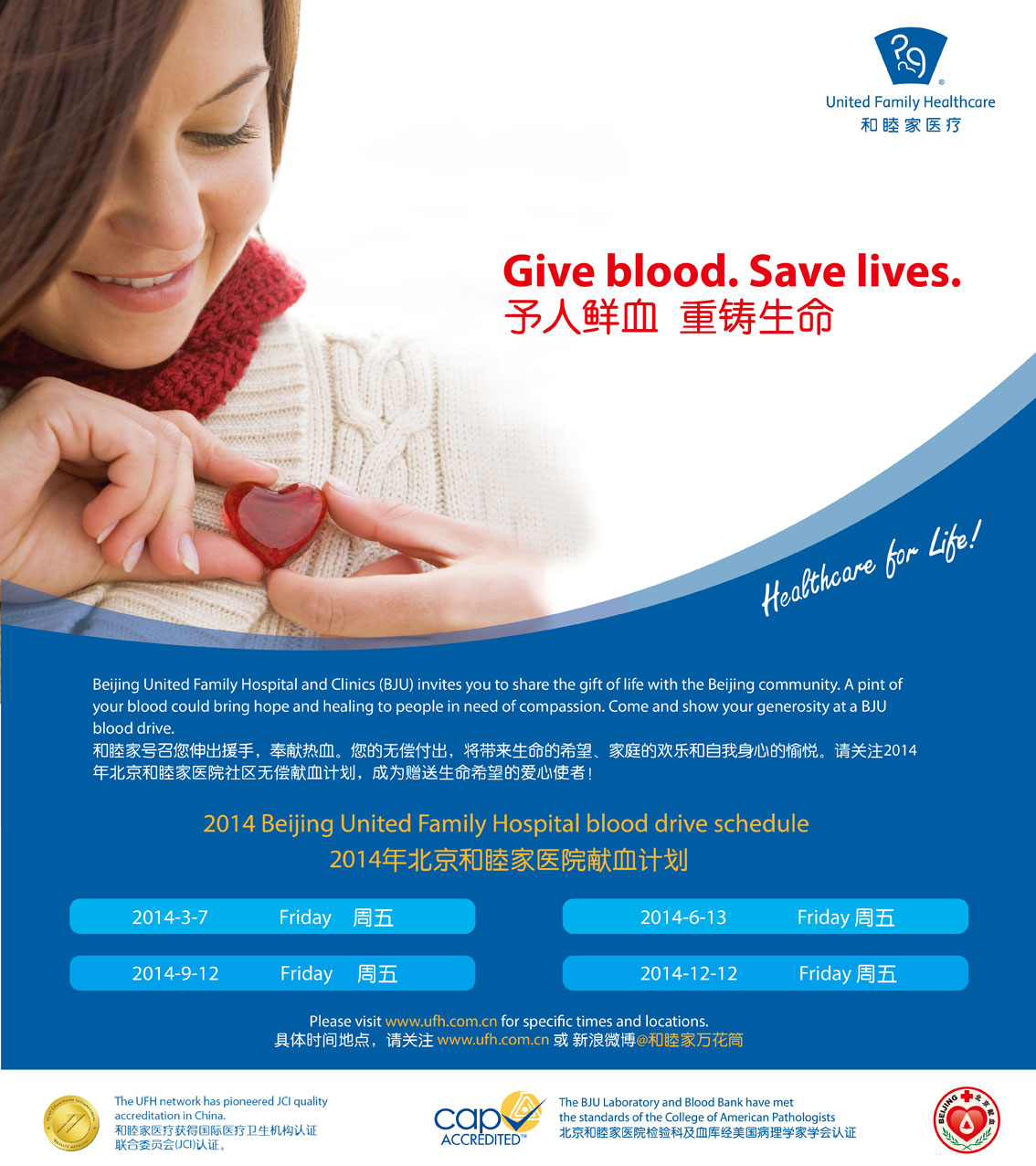
BJU Blood Drive Friday, September 12
On Friday, September 12, Beijing United Family Hospital will hold its next community blood drive from 10 am to 3 pm on the third floor of Building 2. This blood drive is in cooperation with the Tongzhou Blood Bank and open to all. United Family Healthcare invites you to come give the gift of life to those in need.
Ever wonder about giving blood in China? Here’s a quick guide to blood drive safety in Beijing, BJU’s collection process, and why and how to donate.
Compared with star doctors, new technology and medical breakthroughs for rare diseases, the business of blood is a relatively unglamorous and—for the squeamish—an unsightly aspect of healthcare. But the truth is that having a safe and reliable source of blood is one of the most critical aspects of the operation of any hospital. Without a safe supply of donated blood, even the most sophisticated hospitals cannot save a patient in an emergency situation in need of a transfusion. Recent decades have seen a push to get this integral yet behind-the-scenes process more out into the open and help people realize what their role is in supporting their community’s healthcare ecosystem. To illuminate this process, here is a brief summary of Beijing United Family Hospital and Clinics’ (BJU) system for collecting and processing blood and how you can get involved to give the gift of life.
Is donating blood in China safe? How about receiving a transfusion?
Safety is the paramount concern in all blood donation and collection. BJU and other United Family Healthcare facilities are the only facilities in China to have blood banks that are certified by the College of American Pathologists (CAP) and blood that is triple-screened. BJU cooperates with Beijing’s supervising authority, the Beijing Blood Administration Office, and its collection headquarters in Tongzhou to organize blood drives. BJU additionally independently screens all blood received from the Tongzhou blood bank to ensure absolute safety.
Donor safety is guaranteed by rigorous standards for a safe and sterile process, conducted the same way as in the U.S. Needles and bags used to collect blood are used only once and then discarded, making the spread of any infection to the donor impossible.
How does the blood get from donor to recipient?
How much blood is taken? Will it make me weak?
In China, you can choose to donate either 200 or 400mL, less than 10% of the body’s total blood volume (blood donations in the U.S. are closer to 500 mL). The vast majority of people feel fine during and after their donation. A very small percentage of people may experience temporary dizziness, but some rest and fluids will help you recover quickly. Your body will replace the lost fluids within 24 hours.
How long does it take to donate blood?
The whole process takes about 30 to 40 minutes. It starts with registration, questions, a mini-physical examination (vital signs, weight, hemoglobin, blood typing) and blood screenings. The actual donation takes around 5 to 10 minutes.
Why is Rh negative blood special?
Only three out of every 1000 (0.3%) Han Chinese have Rh negative blood. In Western countries, this blood type is much more common, present in up to 15% of the population. Although all blood donors are welcome to give blood, we hope that those with Rh negative blood will help to increase the supply of that blood type in Beijing.
How can I ensure a pleasant donation experience?
Ensure that you are well rested, fed and hydrated before donating. Do not eat greasy food in the 24 hours before your donation. After your donation, have a light snack and plenty of fluids. Continue with your daily activities, but avoid heavy lifting or strenuous exercise for the remainder of the day.
Under what situations could I be disqualified for donating blood?
Though you may be eligible to donate for other blood drives, you may be asked not to donate during this blood drive if…
1) you’ve had any sort of oral medical care (including scaling, etc.) within the past three days, or if you’ve had a tooth extraction or any other minor operation within the past two weeks.
2) you are pregnant or have had an abortion within six months, or if you’ve given birth or have been lactating within the past year.
3) you’ve caught a cold or suffered from acute gastroenteritis within the last week, or had an acute urinary tract infection within the past month or pneumonia within the past three months.
4) you’ve recently suffered from an infectious disease, such as dysentery within the past six months, typhoid within the past year, brucellosis within the past two years, or malaria within the past three years.
5) you’ve received a blood transfusion within the past year.
6) you’ve had a large operation within the past six months; or you underwent an appendectomy, hernia repair, or tonsillectomy within the past three months
7) you’ve had an infection or localized skin inflammation within the past week, or a generalized inflammation within the past two weeks
Who is not allowed to donate blood?
You cannot donate blood if you have any of the following:
1) A venereal disease, leprosy or HIV/AIDS.
2) Hepatitis (hepatitis B whose surface antigen is positive, or hepatitis C with positive antibody).
3) Persistent allergies, such as recurring hives, bronchial asthma, or drug allergies.
4) Tuberculosis.
5) Cardiovascular diseases, such as hypertension, hypotension, myocarditis or thrombotic phlebitis.
6) Respiratory diseases, such as chronic bronchitis, bronchiectasis, emphysema, bronchiectasis or pulmonary insufficiency.
7) Digestive diseases, such as chronic gastroenteritis, active or recurrent gastric and duodenal ulcers, chronic pancreatitis and nonspecific ulcerative colitis.
8) Hematological diseases, such as anemia, leukemia, polycythemia vera, or various bleeding or coagulation disorders.
9) Endocrine or metabolic disorders, such as pituitary and adrenal diseases, hyperthyroidism, acromegaly or diabetes.
10) Mental illnesses, such as depression, mania, schizophrenia or hysteria.
11) Parasitic and endemic diseases, such as leishmaniasis, schistosomiasis, filariasis, hookworm, cysticercosis, paragonimiasis, or Keshan or Kashin-Beck diseases.
12) Malignant or benign tumors.
13) Surgeries on vital organs, such as the stomach, kidney or spleen.
14) Chronic skin diseases, especially infectious, allergic and generalized inflammatory diseases, such as favus, generalized eczema or psoriasis.
15) Eye diseases, such as keratitis, iritis, optic neuritis or high myopia with fundus changes
16) Autoimmune and collagen diseases, such as systemic lupus erythematosus, dermatitis, scleroderma, rheumatoid arthritis or takayasu arteritis.
17) A history of drug abuse.
18) The medical examiner declares that you cannot give blood.
For more information about upcoming blood drives at BJU, please contact Cao Yu at cao.yu@ufh.com.cn.
Copyright United Family Healthcare 2014 All right reserved - 京卫网审[2014]第1927号 - 京ICP备13017554号-4







